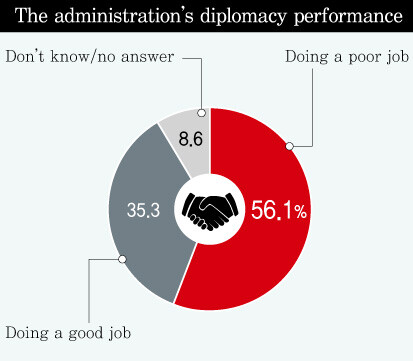hankyoreh
Links to other country sites 다른 나라 사이트 링크
Hankyoreh poll: on diplomacy, Park Geun-hye administration gets a failing grade

Over half of South Koreans rate the current administration’s diplomatic performance as poor, a recent poll found.
The study, conducted on May 11 by the Hankyoreh Institute for Social, found 56.1% of respondents rating the Park Geun-hye administration’s diplomatic efforts as “poor,” compared to just 35.5% rating them as “good.” The poll was conducted to mark the 27th anniversary of the Hankyoreh‘s founding
Seoul has been under fire for a number of diplomatic failures recently, including the “second honeymoon” between Washington and Tokyo after Japanese Prime Minister Shinzo Abe’s US visit last month and the growing possibility that locations where Koreans were forcibly conscripted in Japan during World War II will be listed as UNESCO World Heritage Sites.
Indeed, the administration’s diplomacy received higher “poor” ratings than “good” for all age groups except 60 and over, including 74% for respondents aged 20-29, 74.4% for those aged 30-39, 68.4% for those aged 40-49, and 49.6% for those aged 50-59.
On the May 24 Measures, sanctions suspending inter-Korean trade and exchange enacted in the wake of the 2010 ROKS Cheonan warship sinking, 45.2% of respondents said they should not be lifted until North Korea apologizes. Another 35.6% agreed that humanitarian aid should be resumed even without an apology, while 6.6% said all support measures for the North should be resumed without an apology.
By age group, 42.0% of respondents in their forties and 47.6% of those in the fifties said humanitarian aid should be resumed even without an apology. In both cases, the percentage was higher than the number insisting on not lifting the measures until North Korea apologizes.
But the choice in favor of keeping the measures in place was most frequently chosen by respondents aged 20-29 (58.5%), 30-39 (44.3%), and sixty and over (44.7%). The number suggest that the segment in their forties and fifties, which includes the so-called “386 generation,” is more progressive on North Korea issues, while older people - and even younger people in their twenties and thirties - are taking more of a hard line.
The May 24 Measures, enacted by the Lee Myung-bak administration (in office 2008-2013) after North Korea was blamed for sinking the Cheonan, have limited humanitarian aid to only the most vulnerable segments in North Korea and banned rice and fertilizer aid outright. In late April, the administration approved a small-scale 15-ton shipment of fertilizer aid from a private group, the first such approval granted since the measures were enacted.
Poll results also showed strong support for Seoul’s policy of not holding summits with Tokyo until the latter takes good-faith action on the comfort women issue. A total of 57.4% of respondents expressed support for the policy, while 33.8% said measures on the comfort women issue should be addressed separately from South Korea-Japan summits.
By Kim Ji-hoon, staff reporter
Please direct questions or comments to [english@hani.co.kr]

Editorial・opinion
![[Guest essay] Maybe Korea’s rapid population decline is an opportunity, not a crisis [Guest essay] Maybe Korea’s rapid population decline is an opportunity, not a crisis](https://flexible.img.hani.co.kr/flexible/normal/500/300/imgdb/original/2024/0430/9417144634983596.jpg) [Guest essay] Maybe Korea’s rapid population decline is an opportunity, not a crisis
[Guest essay] Maybe Korea’s rapid population decline is an opportunity, not a crisis![[Column] Can Yoon steer diplomacy with Russia, China back on track? [Column] Can Yoon steer diplomacy with Russia, China back on track?](https://flexible.img.hani.co.kr/flexible/normal/500/300/imgdb/original/2024/0430/1617144616798244.jpg) [Column] Can Yoon steer diplomacy with Russia, China back on track?
[Column] Can Yoon steer diplomacy with Russia, China back on track?- [Column] Season 2 of special prosecutor probe may be coming to Korea soon
- [Column] Park Geun-hye déjà vu in Yoon Suk-yeol
- [Editorial] New weight of N. Korea’s nuclear threats makes dialogue all the more urgent
- [Guest essay] The real reason Korea’s new right wants to dub Rhee a founding father
- [Column] ‘Choson’: Is it time we start referring to N. Korea in its own terms?
- [Editorial] Japan’s rewriting of history with Korea has gone too far
- [Column] The president’s questionable capacity for dialogue
- [Column] Are chaebol firms just pizza pies for families to divvy up as they please?
Most viewed articles
- 1Under conservative chief, Korea’s TRC brands teenage wartime massacre victims as traitors
- 2Months and months of overdue wages are pushing migrant workers in Korea into debt
- 3[Guest essay] Maybe Korea’s rapid population decline is an opportunity, not a crisis
- 4[Column] Can Yoon steer diplomacy with Russia, China back on track?
- 5First meeting between Yoon, Lee in 2 years ends without compromise or agreement
- 6After election rout, Yoon’s left with 3 choices for dealing with the opposition
- 7[Column] Behind factional animus of Korean politics, victim mentality festers
- 8‘We must say no’: Seoul defense chief on Korean, USFK involvement in hypothetical Taiwan crisis
- 9[Editorial] Japan’s removal of forced labor memorial tramples on remembrance, reflection and friends
- 10[Guest essay] A society in which old age becomes a burden